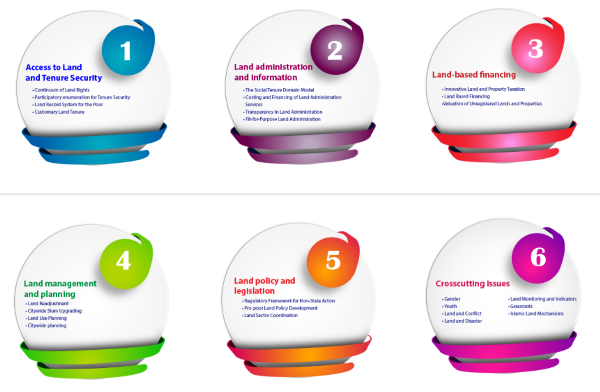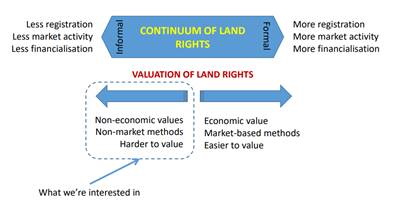|


As one of the founding partners of the Global
Land Tool Network (GLTN), FIG has contributed to the
development of land tools with GLTN since 2006.
Today, GLTN has grown to have 80 partners divided
into four different clusters, Bilateral and
Multilateral Organisations, International Training
and Research Institutions, Rural/Urban International
Civil Societies and International Professional
Bodies. FIG is a member of the International
Professional Bodies Cluster, and has had the honour
for several terms to be the lead of the cluster.
During the current term, 2019-2020, the cluster lead
is jointly held by Arab Union and FIG.
Today, with its partners GLTN has developed 25
tools in the areas:
.
The areas are: Access to land and tenure security, Land administration and information, Land-based financing, Land management and planning, Land policy and legislation, Cross-cutting issues such as gender, youth, land and conflict etc.
Source:
www.gltn.net
Over the years and since 2006, FIG has been involved
in the development of many of these tools. Today,
the tools are successfully used in many projects at
a local, national and regional level.
Still, some of the tools need to be further
developed and refined, and FIG, together with the
other members of the International professional
bodies cluster are pleased to be part of this work.
Currently the International professional bodies
cluster is working on two different activities.
Already some work has been done on these two
activities, and the idea was to bring the current
material to the FIG Working Week 2020 where two
dedicated sessions were prepared for a consultation
with experts in the hope to encourage good
discussions and progress among the participants of
FIG Working Week.
The two activities during the term 2019-2020 are:
- Development
of a conceptual framework on urban-rural land
linkages
- Development
of a manual on valuation of unregistered lands
Development of a conceptual framework on urban-rural
land linkages
Traditionally, land policies have been developed
separately between rural and urban areas. There is a
strong push from international organization,
particularly UN, to change this. These institutions
call for the urgent need to plan, design and
implement integrated policies and programmes within
the urban-rural continuum as compared to the
traditional binary approach of focusing only in
urban or rural contexts. They argue that urban and
rural spaces offer different but complementary
assets and strengths and better integration of
development interventions is needed to ensure better
socio-economic performance. However, land being
central in the development discourse and in the
‘spatial’ aspects of development is not well
articulated in the debates nor it features as a key
“core” component of urban-rural linkages discourse.
There is a need to reverse this situation and the
development of a conceptual framework on urban-rural
land linkages becomes a necessity. This task
involves a scoping of existing work in this topic,
understanding its relevance to the over-all
sustainable development agenda, identifying key
challenges as well as potential opportunities,
discussions and consultations with experts, and
finally, offering a robust conceptual framework.
During FIG Working Week, the open workshop would
have presented the literature review for the land
sector and a preliminary scoping document for the
conceptual framework. Participants would have had
the opportunity to participate in the development of
this UN framework as well as interacting with key
practitioners in the urban-rural linkage area.
The expert group is working on alternative ways for
a consultation session.
Development of a manual on valuation of unregistered
lands
Another interactive session was planned for FIG
Working Week 2020 on the topic of the valuation of
unregistered lands.
Following
UN-Habitat/GLTN’s guide no. 1/2018,
which explains why valuations of unregistered land
and informal property are needed, and
RICS Research
(valuation of unregistered land),
UN-Habitat/GLTN is developing a robust, due
diligence protocol and manual (including basic
checklists and sample formats) on the registration
of unregistered lands.
Value, and its attribution to unregistered and/or
informal land & property, is a key component to
sustainable land administration systems and is a
critical component of effective land acquisition,
taxation and transfer processes. Indeed, it can be
argued that ‘value’, whether defined in purely
economic terms or in a wider context of social,
environmental and cultural value, is the key to
establishing tenure security and identification of
legitimate ownership. ‘Value’ is directly linked to
local and regional revenue generation, functioning
formalized land & property markets and is a central
enabling factor within land-based financing (as
underlined within the New Urban Agenda). However,
this is a difficult area, with limited professional
capacity and knowledge, and a chronic lack of data
and in many cases cultural/social understanding.
Several organisations, agencies and NGOs (GLTN,
RICS, FIG, UNFAO, Namati) have attempted to better
understand unregistered land valuation and informal
markets through extensive research, policy guides,
international guidelines (VGGT) and due diligence
standards (ILMS & UNFAO – lawyers advising on land
acquisition). This has resulted in strong empirical
evidence and potential governance but not in a
practical, field-based due diligence protocol for
how to arrive at appropriate and reasonable market[1]
‘value’. This manual has a great opportunity to
synthesize previous outputs, bring closer
collaboration between interested parties through the
formation of a working group, and help ‘value’
become more effective and appropriate during the
land formalization, acquisition, transfer and
taxation process.
A masterclass was planned to take place at the World
Bank meeting in March 2020 which was cancelled due
to COVID-19. Instead an online meeting was held, and
all experts involved in this activity were looking
forward to having another consultation face-to-face
in Amsterdam during FIG Working Week. The planned
session was meant as an interactive consultation,
bringing together expert views on a new unregistered
land valuation manual that will cover about 70
percent of the land surface of the world. This
consultation will now also be changed to an online
version. The intention was to discuss the
preliminary work of the authors, initial concepts
that need to be recognised and included and also act
as an opportunity to engage the global FIG family of
land professionals.
Authors of the manual are Dr. Mike McDermott and Dr.
Peter Wyatt, who had looked forward to an open
discussion on the format of the GLTN manual and a
debate on the changing nature of valuation and its
critical interaction with developing world land
security, informality and differing forms of tenure.

Louise Friis-Hansen, FIG
|
|
